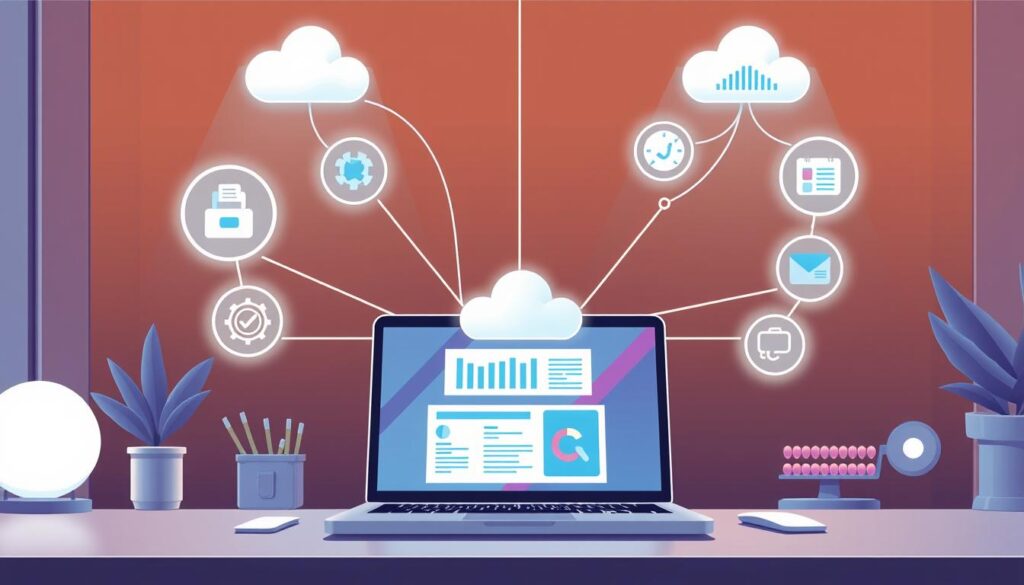The Best Accounting Software for Solo Entrepreneurs
Are you a solo entrepreneur overwhelmed by receipts and invoices? The right accounting software could save you. But, with so many choices, picking the best for your business can be tough.
Managing money is hard for small business owners, even more so for solo ones. PCMag says no two businesses need the same accounting. This is true for freelancers and self-employed folks who handle many tasks.
The best accounting software for solo entrepreneurs can make managing money easier. It saves time and reduces stress. It helps with tracking expenses and making reports. Let’s look at top picks like QuickBooks Online, FreshBooks, and Xero, designed for solo entrepreneurs.
Key Takeaways
- Proper financial management is crucial for solo entrepreneurs
- Accounting software can significantly streamline financial tasks
- QuickBooks Online, FreshBooks, and Xero are top-rated options
- Pricing varies widely, with some offering free trials or discounts
- Features like mobile accessibility and automated reporting are essential
- Choosing the right software depends on your specific business needs
Understanding the Needs of Solo Entrepreneurs
Solo entrepreneurs face unique financial challenges. The right bookkeeping tools can greatly help their success. Let’s look at why accounting is key and the hurdles they face.
Importance of Accounting for One-Person Businesses
Good accounting is vital for solo entrepreneurs. It ensures tax compliance, financial planning, and growth. Accurate bookkeeping tracks income, expenses, and profits.
Invoicing software for independent contractors makes billing easier. It saves time and ensures payments are on time. NerdWallet says the best software should be affordable, have strong invoicing, and track expenses well.
Unique Challenges Solo Entrepreneurs Face
Solo entrepreneurs often struggle with time and resources. They handle client work, marketing, and finances alone. This can cause them to overlook accounting tasks.
| Challenge | Impact | Solution |
|---|---|---|
| Time constraints | Neglected bookkeeping | Automated accounting software |
| Limited budget | Inadequate financial tools | Affordable software options |
| Lack of expertise | Errors in financial records | User-friendly accounting platforms |
The right accounting software can solve these problems. It automates tasks, cuts down errors, and offers insights. For example, Wave is free and helps solopreneurs with their finances.
“Maintaining a system to track income and expenses is crucial for managing cash flow and ensuring compliance with tax laws.”
By knowing their needs and challenges, solo entrepreneurs can pick the best accounting tools. This supports their business growth and financial health.
Key Features to Look for in Accounting Software
Choosing the right accounting software is key for solo entrepreneurs. When looking at expense tracking apps for small businesses, some features are must-haves for smooth operations.
User-Friendly Interface
A simple, easy-to-use interface is a must for those not into accounting. Look for software that’s easy to navigate and shows data clearly. This way, you can handle your finances without getting lost, saving time and avoiding mistakes.
Automated Reporting and Analytics
Good accounting software should have strong reporting tools. It should automatically create important financial reports like profit and loss statements. These tools give you real-time financial insights, helping you make better decisions.
Mobile Accessibility
Being able to access your finances anywhere is crucial for entrepreneurs. Mobile apps let you track expenses, send invoices, and check your financial status from anywhere. This keeps you connected to your finances, no matter where you are.
| Feature | Benefit |
|---|---|
| Double-Entry Accounting | Ensures accuracy in financial records |
| Bank Feed Integration | Automates transaction imports, reducing manual entry |
| Automated Invoicing | Speeds up revenue collection process |
| Online Payment Options | Facilitates faster customer payments |
By focusing on these features, solo entrepreneurs can find accounting software that supports their business now and in the future. The right tools can turn financial management into a strategic advantage for your business.
Top Accounting Software Options for Solo Entrepreneurs
Finding the right accounting software can change your game. Let’s look at three top picks for solo entrepreneurs.
QuickBooks Online
QuickBooks Online is a top choice for solo entrepreneurs. It starts at $25/month and has features like expense tracking and invoicing. It also has tax management and mileage tracking for professionals always on the move.
It’s a complete solution for freelancers who need to manage their finances well.
FreshBooks
FreshBooks starts at $15/month and is great for service-based businesses. It’s known for easy invoicing and a simple interface. It also has tools for time tracking and project management, perfect for handling many clients.
It even has a Solopreneur plan at $6/month, designed for solo operations.
Xero
Xero starts at $13/month and has over 800 integrations. It’s perfect for solo entrepreneurs working globally, thanks to its multi-currency support. It’s also scalable, fitting the needs of growing businesses.
| Software | Starting Price | Key Feature |
|---|---|---|
| QuickBooks Online | $25/month | Comprehensive toolkit |
| FreshBooks | $15/month | Strong invoicing capabilities |
| Xero | $13/month | Extensive integrations |
Each software has mobile apps for managing finances anywhere. The best choice depends on your needs and budget. Try their free trials to find the best fit for you.
Pros and Cons of Each Software Solution
Choosing the right accounting software for startups can be tough. Let’s look at the good and bad sides of three popular options: QuickBooks Online, FreshBooks, and Xero.
QuickBooks Online: Strengths and Weaknesses
QuickBooks Online is great for customizing and has a huge app marketplace. It offers a 50% discount for the first 3 months, at $20 per month. It’s perfect for tracking miles and estimating taxes, which is key for solo entrepreneurs.
- Pros: Highly customizable, extensive integrations
- Cons: Can be expensive, steep learning curve
FreshBooks: Advantages and Disadvantages
FreshBooks is known for its easy-to-use interface and strong invoicing. It has a 50% discount for six months, starting at $9.50 per month. It also has great mobile apps for iOS and Android.
- Pros: Simple to use, great for service-based businesses
- Cons: Limited user accounts, weak inventory tracking
Xero: Evaluating the Benefits and Drawbacks
Xero offers a lot with unlimited user accounts and good prices. It connects with over 21,000 financial institutions for easy data imports. Freelancers can find certified CPAs nearby through the platform.
- Pros: Unlimited users, good value for money
- Cons: Limited transaction templates, may lack some advanced features
When picking accounting software, think about your needs, budget, and future plans. Each software has its own strengths, making them right for different solo entrepreneurs and startups.
Pricing Comparison: Finding the Best Value
Choosing the right accounting software for freelancers means looking at prices and what you get for them. We’ll compare costs and benefits of top choices to guide your decision.
Monthly Subscription Costs
Prices for tax software for solo proprietors vary a lot. QuickBooks Online starts at $30/month, and Xero at $15/month. Zoho Books is more affordable at $10/month, and FreshBooks at $17/month. Wave Accounting offers a free version for those on a tight budget.
| Software | Starting Price | Key Features |
|---|---|---|
| QuickBooks Online | $30/month | Versatile, extensive integrations |
| Xero | $15/month | Unlimited users, comprehensive reporting |
| Zoho Books | $10/month | Multi-currency support, time tracking |
| FreshBooks | $17/month | User-friendly, project management tools |
| Wave Accounting | Free | Basic features, add-ons available |
Free Trials and Discounts
Most accounting software for freelancers offers 30-day free trials. This lets you try before you buy. Some also give big discounts. For example, Xero has 90% off for the first 6 months, and QuickBooks Online offers 50% off for the first 3 months.
Long-term Savings Considerations
Think about the software’s scalability for long-term costs. Wave’s free option might seem good at first, but you might need more as your business grows. QuickBooks and Xero offer solutions that grow with you, saving money by avoiding platform changes.
“Investing in the right accounting software can save solo entrepreneurs significant time and money in the long term.”
Consider the time saved with automation and the cost of mistakes when picking your software. The right choice can make managing your finances easier and help your business succeed.
Integrations That Enhance Accounting Software
Cloud-based accounting for entrepreneurs has grown a lot. Now, it offers strong integrations that make things easier and faster. Let’s look at some key integrations that can make your accounting software better.
Payment Processing Options
Good payment processing is key for keeping money flowing. Many accounting tools work with top payment gateways. This lets you take payments right from invoices. It’s great for freelancers, as it cuts down on payment delays and boosts cash flow.
Project Management Tools
Linking project management tools with your accounting software is smart. It helps track hours, manage costs, and make accurate invoices. This is super helpful for service-based businesses that need to keep an eye on profit margins.
E-commerce Platforms
For online stores, linking e-commerce platforms with accounting software is a big win. It automates sales data, tracks inventory, and reports finances. This saves a lot of time and cuts down on mistakes.

- 67% of accountants prefer cloud-hosted accounting solutions over on-premise software
- Businesses using automated systems are 30% more likely to generate accurate financial reports
- Smart categorization in accounting software can reduce errors in financial records by 40%
By using these integrations, solo entrepreneurs can build a strong system. It makes accounting easier and gives insights for growing the business.
Tips for Selecting the Right Software
Choosing the right accounting software for solo entrepreneurs can be tough. This guide will help you find the best bookkeeping tools for solopreneurs.
Assessing Your Specific Needs
First, think about what your business needs. Look at things like how many transactions you do, if you need special features for your industry, and if you plan to grow. Find software that:
- Has customizable dashboards
- Is easy to navigate
- Can grow with your business
- Works well with CRM systems and payment gateways
- Is accessible on mobile devices
Testing Software with Free Trials
Many platforms offer 30-day free trials. This is a great chance to try out the software. Use this time to:
- Test making invoices and customizing them
- See how the reporting works
- Check if it works with your current systems
- Get a feel for how easy it is to use
Reading User Reviews and Comparisons
What other users say is very helpful. Look for reviews from businesses like yours. Pay attention to:
- How easy it is to use
- The quality of customer support
- If the features work well
- If it’s a good value
| Feature | Importance |
|---|---|
| Multi-currency support | Essential for international transactions |
| Automated tax calculations | Saves time and reduces errors |
| Data migration tools | Ensures smooth transition from other systems |
| Regular software updates | Indicates commitment to innovation |
By following these tips, you’ll be ready to pick the best accounting software for solo entrepreneurs. It will meet your specific business needs.
Common Mistakes to Avoid When Using Accounting Software
Running a business alone can be tough, and managing money is a big part of it. Many solo business owners make big mistakes with accounting software. These errors can cause serious problems. Let’s look at some common mistakes and how to steer clear of them.
Underestimating Tracking Expenses
Tracking expenses well is key for solo business owners. But, 70% of small businesses pick accounting software without knowing what they really need. This can lead to losing out on tax savings and wrong financial reports. Using expense tracking apps can help keep track of every dollar.
Ignoring Software Updates
25% of businesses don’t see the importance of keeping their accounting software up to date. Not doing so can make your software less secure and miss out on new features. Keeping your software updated keeps it running smoothly and keeps your financial data safe.
Not Backing Up Data Regularly
Lost data can be a disaster for any business. Yet, many solo business owners don’t back up their financial data often enough. Mobile accounting apps for freelancers often have cloud storage, adding an extra layer of protection. Backing up your data every day is a good habit to keep your financial info safe.
| Common Mistake | Percentage of Businesses Affected | Potential Consequence |
|---|---|---|
| Choosing software without understanding needs | 70% | Inefficient financial management |
| Neglecting software updates | 25% | Security vulnerabilities |
| Lack of mobile access | 30% | Limited financial oversight |
By avoiding these common mistakes, solo entrepreneurs can make sure their accounting software works well for their business. This leads to better money management and smarter business decisions.
Conclusion: Making the Right Choice for Your Business
Choosing the best accounting software is key for solo entrepreneurs. It saves time, reduces stress, and offers insights. With 60% of small businesses using it, it’s a must-have.
Recap of Key Considerations
When picking the right software, think about what you need. Look for easy expense tracking, automated reports, and mobile access. 40% of small business owners cut bookkeeping time in half with the right tool.
Pricing matters too. Options like Collective offer services from $297 to $349 monthly.
Future Trends in Accounting Software for Entrepreneurs
The future of accounting software looks good. Cloud-based solutions and mobile apps are becoming more popular. AI and automation will make managing finances even easier.
As your business grows, your accounting needs will too. Choose a solution that can grow with you.
By choosing the right accounting software, you’re setting your business up for success. The right tools can make you feel more secure about your finances. Make a smart choice and let your software support your growing business.
Source Links
- https://www.pcmag.com/picks/the-best-small-business-accounting-software – The Best Accounting Software for Small Businesses in 2025
- https://www.cnbc.com/select/best-accounting-software-for-small-businesses/ – 5 of the best accounting software services for small businesses
- https://www.doola.com/blog/best-bookkeeping-tools-for-solo-entrepreneurs/ – Best Bookkeeping Tools For Solo Entrepreneurs – doola: Start your dream US business and keep it 100% compliant
- https://www.e-resident.gov.ee/blog/posts/accounting-for-solopreneurs/ – Accounting for solopreneurs | Digital and easy with e-Residency
- https://www.business.com/articles/features-of-accounting-software/ – Features and Benefits of Accounting Software – business.com
- https://www.patriotsoftware.com/blog/accounting/sole-proprietor-accounting-software/ – Accounting Software for Sole Proprietor: What to Know
- https://www.dipolediamond.com/top-10-automated-accounting-software-for-small-businesses-in-finance/ – Top 10 Automated Accounting Software For Small Businesses
- https://sonary.com/accounting-software/self-employed/ – Best Accounting Software For Self-Employed 2025 | Sonary
- https://smallbusinesshq.co/best-accounting-software-for-self-employed/ – Best Accounting Software for Self-Employed People | SBHQ
- https://www.withorb.com/blog/saas-accounting-software – Orb | The 12 most practical SaaS accounting software solutions
- https://www.doola.com/blog/best-bookkeeping-software-for-startups-and-small-business-owners-reviewed-in-2024/ – Best Bookkeeping Software for Startups and Small Business Owners Reviewed in 2025 – doola: Start your dream US business and keep it 100% compliant
- https://tipalti.com/blog/small-business-accounting-software-uk/?intvn – What’s the Best Accounting Software for Small Businesses in 2025?
- https://pcoutlet.com/software/applications/the-best-small-business-accounting-software – The Best Small Business Accounting Software: Top Solutions for 2025 – PC Outlet
- https://www.invensis.net/blog/best-accounting-software-for-small-businesses – 8 Best Accounting Software for Small Businesses
- https://www.ccmonet.ai/blog-posts-new/top-10-accounting-software-features-for-small-business-success – Top 10 Accounting Software Features for Small Business Success
- https://kruzeconsulting.com/startup-accounting-software/ – Best Startup Accounting Software
- https://www.linkedin.com/pulse/18-tips-choosing-right-accounting-software-guide-umair-a-r-mughal-3ykzf – 18 Tips for Choosing the Right Accounting Software: A Comprehensive Guide
- https://www.business.com/articles/accounting-software/ – How to Choose the Right Business Accounting Software
- https://www.easyledgerpro.com/common-mistakes-when-choosing-accounting-software/ – Common Mistakes When Choosing Accounting Software and How to Avoid Them
- https://www.business.com/articles/small-business-accounting-mistakes/ – Accounting Mistakes Your Small Business Should Avoid
- https://morganoverholt.com/editorials/bench-accounting-alternative/ – Bench Accounting Alternative: Solo Entrepreneurs Turn to Collective Amid Shutdown
- https://www.milestone.inc/blog/what-is-the-best-bookkeeping-method-for-small-business – What Is The Best Bookkeeping Method For Small Business







